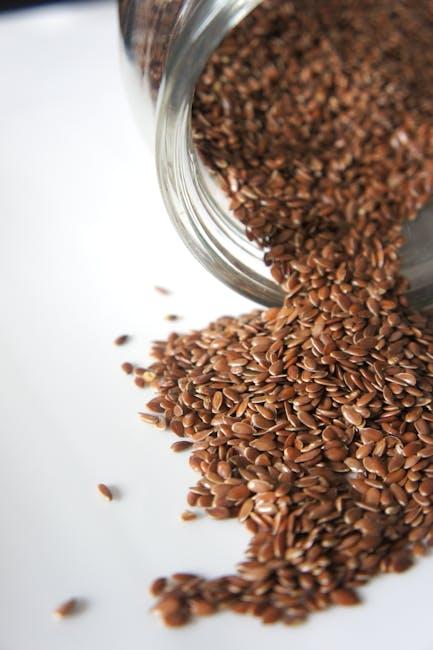In the intricate world within our digestive system, a delicate balance of microorganisms works tirelessly to support our overall health. Among the many factors influencing this hidden ecosystem, omega-3 fatty acids have emerged as surprising yet powerful allies. Often celebrated for their heart-healthy and brain-boosting properties, omega-3s are now capturing the spotlight for their potential to nurture and restore gut health. This article delves into the fascinating connection between omega-3s and the gut, exploring how these essential fats might play a crucial role in maintaining digestion, reducing inflammation, and promoting a thriving internal environment.
Table of Contents
- The Role of Omega-3 Fatty Acids in Supporting Gut Microbiome Diversity
- How Omega-3s Combat Inflammation Within the Digestive Tract
- Understanding the Connection Between Omega-3s and Intestinal Barrier Health
- Incorporating Omega-3 Rich Foods for Optimal Digestive Wellness
- Practical Tips for Balancing Omega-3 Intake to Enhance Gut Function
- Q&A
- Closing Remarks

The Role of Omega-3 Fatty Acids in Supporting Gut Microbiome Diversity
Omega-3 fatty acids play an essential role in maintaining a balanced and diverse gut microbiome, which is crucial for overall digestive health. These polyunsaturated fats, commonly found in fatty fish, flaxseeds, and walnuts, act as anti-inflammatory agents that help create a favorable environment for beneficial bacteria to thrive. Research shows that omega-3s can enhance the growth of *Lactobacillus* and *Bifidobacterium*, two important genera of gut microbes associated with improved digestion, immune function, and even mood regulation.
Understanding how omega-3s impact gut flora diversity includes key benefits such as:
- Reducing harmful bacterial populations through anti-inflammatory action
- Supporting the production of short-chain fatty acids that nourish colon cells
- Enhancing the gut barrier function to prevent unwanted pathogens from entering the bloodstream
| Omega-3 Source | Key Microbial Effect | Health Implication |
|---|---|---|
| Salmon | Boosts *Bifidobacterium* | Improved digestion and immunity |
| Chia Seeds | Enhances short-chain fatty acids | Supports colon health |
| Walnuts | Increases *Lactobacillus* abundance | Reduced inflammation |

How Omega-3s Combat Inflammation Within the Digestive Tract
Omega-3 fatty acids play a pivotal role in modulating inflammatory responses in the digestive tract by balancing the production of pro-inflammatory and anti-inflammatory molecules. These essential fats integrate into cell membranes, promoting the synthesis of resolvins and protectins—specialized compounds that actively resolve inflammation. This biological mechanism helps reduce immune system overactivity, soothing symptoms such as bloating, abdominal pain, and discomfort commonly associated with chronic gut inflammation.
Incorporating omega-3s into your diet supports gut health through multiple pathways, including:
- Reducing cytokine production, which limits inflammation signaling in intestinal tissues.
- Enhancing the integrity of the gut lining, preventing harmful microbes and toxins from triggering immune reactions.
- Supporting beneficial gut bacteria that contribute to a balanced and resilient microbiome.
| Omega-3 Type | Primary Function | Gut Benefit |
|---|---|---|
| EPA (Eicosapentaenoic Acid) | Anti-inflammatory mediator production | Reduces intestinal swelling |
| DHA (Docosahexaenoic Acid) | Cell membrane fluidity enhancement | Improves gut barrier function |
| ALA (Alpha-Linolenic Acid) | Precursor to EPA and DHA | Supports overall anti-inflammatory balance |

Understanding the Connection Between Omega-3s and Intestinal Barrier Health
Omega-3 fatty acids play a pivotal role in maintaining the integrity of the intestinal barrier, a crucial line of defense that prevents harmful substances from leaking into the bloodstream. This dynamic barrier consists primarily of tightly packed cells that regulate permeability, and omega-3s help to strengthen these cellular junctions. By reducing inflammation and promoting the production of protective mucus, these essential fats foster a resilient environment where beneficial gut bacteria can flourish, ultimately supporting better digestive health and immune function.
In addition to their structural benefits, omega-3s influence the gut through a variety of mechanisms that enhance overall barrier function. Key effects include:
- Inflammation modulation: Omega-3s reduce pro-inflammatory cytokines that can damage intestinal lining.
- Microbiota balance: They encourage the growth of friendly bacteria species important for gut homeostasis.
- Cell membrane fluidity: Enhancing the flexibility and repair capacity of intestinal cells.
| Benefit | Effect on Intestinal Barrier |
|---|---|
| Reduced Permeability | Prevents unwanted toxins from entering bloodstream |
| Enhanced Mucus Layer | Provides a protective cushion for epithelial cells |
| Anti-Inflammatory Action | Limits chronic inflammation that weakens gut lining |

Incorporating Omega-3 Rich Foods for Optimal Digestive Wellness
Boosting your digestive wellness begins with the smart addition of foods abundant in omega-3 fatty acids to your daily diet. These essential fats not only support heart and brain health but also play a vital role in maintaining a balanced gut environment. Incorporating sources such as salmon, flaxseeds, walnuts, and chia seeds encourages anti-inflammatory properties that soothe the digestive tract lining, promoting smoother digestion and better nutrient absorption. This natural approach helps reduce irritation often caused by digestive disorders, fostering a thriving microbiome essential for overall gastrointestinal harmony.
To seamlessly integrate omega-3s into your meals, consider swapping traditional snacks for these nutrient-dense choices or introduce omega-3 fortified ingredients into your favorite recipes. Here’s a quick guide to some top omega-3 rich foods and their key digestive benefits:
| Food Source | Key Benefit for Gut Health | Typical Omega-3 Content (per 100g) |
|---|---|---|
| Wild-caught Salmon | Reduces intestinal inflammation | 2,260 mg |
| Chia Seeds | Promotes healthy bowel movements | 17,550 mg |
| Walnuts | Supports gut microbiota diversity | 9,080 mg |
| Flaxseeds | Enhances digestive tract lining | 22,800 mg |
By creatively incorporating these foods into your menu—whether sprinkling flaxseeds over morning yogurt or enjoying a walnut-rich salad—you pave the way for a resilient and well-functioning digestive system anchored by the power of omega-3s.

Practical Tips for Balancing Omega-3 Intake to Enhance Gut Function
To effectively support your gut health through omega-3 intake, begin by incorporating a diverse range of omega-3 sources into your diet. Fatty fish like salmon, mackerel, and sardines are excellent primary options, but don’t overlook plant-based sources such as flaxseeds, chia seeds, and walnuts. Balancing marine and plant omega-3s not only diversifies your nutrient profile but also helps maintain a healthy ratio of EPA, DHA, and ALA, all critical for gut lining repair and modulation of inflammation.
Here are some handy practices to optimize your omega-3 balance:
- Measure intake: Aim for 250–500 mg daily of combined EPA and DHA, adjusting based on dietary gaps and gut sensitivity.
- Combine with fiber: Pair omega-3 foods with high-fiber vegetables to nurture beneficial gut bacteria.
- Limit processed fats: Reduce omega-6 rich processed oils that can antagonize omega-3 benefits.
- Supplement thoughtfully: Choose high-quality fish oil or algae-based supplements if dietary sources fall short.
| Omega-3 Source | Approx. EPA + DHA (mg/serving) | Gut Benefit |
|---|---|---|
| Salmon (3 oz) | 1,000 | Reduces inflammation, supports mucosal barrier |
| Chia Seeds (1 oz) | 5 (ALA) | Feeds microbiota, promotes short-chain fatty acid production |
| Mackerel (3 oz) | 1,200 | Improves microbiome diversity |
| Walnuts (1 oz) | 137 (ALA) | Balances omega-3/6 ratio, supports gut motility |
Q&A
Q&A: Omega-3s and Gut Health Benefits
Q1: What are Omega-3 fatty acids?
A1: Omega-3 fatty acids are essential fats found primarily in fatty fish, flaxseeds, and walnuts. Your body can’t produce them on its own, so they must come from your diet. These fats play crucial roles in brain function, inflammation reduction, and now, gut health.
Q2: How do Omega-3s impact gut health?
A2: Omega-3s help maintain a healthy balance of gut bacteria by promoting the growth of beneficial microbes. They also reduce inflammation in the gut lining, which can enhance nutrient absorption and strengthen the digestive tract’s barrier function.
Q3: Can Omega-3s improve digestive disorders?
A3: Emerging research suggests that Omega-3s may alleviate symptoms of inflammatory bowel diseases such as Crohn’s disease and ulcerative colitis by modulating immune responses and lowering gut inflammation. However, they are not a standalone cure.
Q4: What is the relationship between Omega-3s and the gut microbiome?
A4: Omega-3s serve as fuel for beneficial gut bacteria, encouraging a diverse and balanced microbiome. A rich microbiome promotes better digestion, immune health, and even mood regulation, underscoring the gut-brain connection.
Q5: How much Omega-3 should one consume for gut benefits?
A5: While there’s no universal daily dose specifically for gut health, experts often recommend around 250-500 mg of combined EPA and DHA (types of Omega-3s) daily for general wellness. Consulting with a healthcare provider ensures personalized needs are met.
Q6: Are there plant-based sources of Omega-3 for gut health?
A6: Yes! Flaxseeds, chia seeds, walnuts, and hemp seeds are excellent plant-based sources of ALA, a type of Omega-3. The body can convert ALA to EPA and DHA, though less efficiently than direct sources like fish oil.
Q7: Can Omega-3 supplements replace a healthy diet?
A7: Supplements can help fill dietary gaps but shouldn’t replace whole foods. A varied diet rich in fiber, fruits, vegetables, and Omega-3-rich foods provides a synergistic effect, supporting overall gut health more effectively.
Q8: Are there any risks of consuming too much Omega-3?
A8: Excessive intake may lead to blood thinning or digestive discomfort. It’s important to follow recommended dosages and consult healthcare professionals, especially if you’re on medication or have health conditions.
Omega-3s are more than just heart-healthy fats — they are key players in nurturing a vibrant, balanced gut ecosystem. Incorporating them thoughtfully into your diet can create ripples of benefits, all starting from your gut’s well-being.
Closing Remarks
In the intricate dance of wellness, omega-3s emerge as a subtle yet powerful partner, gently harmonizing the rhythms of our gut. As science continues to unravel the connection between these essential fats and digestive health, embracing omega-3s could be a simple, natural step toward nurturing not just our gut, but our overall vitality. Whether through vibrant meals or thoughtful supplements, inviting omega-3s into our daily routine may well be a key to unlocking a healthier, balanced future from the inside out.














Leave feedback about this